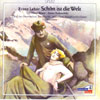Lehár Schön ist die Welt
There’s nothing like an avalanche to bring romance to the night
View record and artist detailsRecord and Artist Details
Composer or Director: Franz Lehár
Genre:
Opera
Label: CPO
Magazine Review Date: 7/2006
Media Format: CD or Download
Media Runtime: 77
Mastering:
Stereo
DDD
Catalogue Number: CPO777 055-2

Tracks:
| Composition | Artist Credit |
|---|---|
| Schön ist die Welt, 'Beautiful World' |
Franz Lehár, Composer
Andreas Hirtreiter, First Man, Tenor Bavarian Radio Chorus Elena Mosuc, Princess Elisabeth, Soprano Elena Mosuc, Mercedes, Soprano Franz Lehár, Composer Isabella Stettner, First Lady, Soprano Masako Goda, Second Lady, Soprano Munich Radio Symphony Orchestra Roland Kandlbinder, Director, Tenor Ulf Schirmer, Conductor Wolfgang Klose, Second Man, Bass Zoran Todorovich, Prince Georg, Tenor Zoran Todorovich, Count Sascha, Tenor |
Author: Mike Ashman
Through-composed operetta? An apparent contradiction in terms, but that was exactly what Lehár succeeded in doing with Act 2 of his 1914 Endlich allein, the score which, revised (but not much in its key central act) as a vehicle for Richard Tauber in 1930, became Schön ist die Welt. Two royal intendeds, reluctant to commit to an arranged marriage, come together as strangers. Princess Elisabeth (in 1914 she was an American adventuress called Dolly, but we’ll let that pass) and Crown Prince Georg (incognito as an Alpine guide) walk in the peaks, pick flowers, hear over the radio that there are fears for Her Highness’s safety, are stranded overnight by an avalanche – and fall in love. At this Lehár throws all the range of his nonpareil orchestral skills, paralleling and anticipating Strauss’s Alpine Symphony (written 1914-15) and, in the first of the three sections which comprise Act 2, encompassing an extraordinary rolling road of tone-poem, accompanied recitative and duet, an ‘operettic’ symphony of singing. The last section of the act delivers both a full evocation of the avalanche and a few-holds-barred love duet. Acts 1 and 3 – as was Lehár’s later model in, for example, Paganini – are pure social comedy, picking up the ‘lower’ couple of the royal equerry and a tango dancer (taken here by the same singers) and unveiling a Butterfly-influenced duet for Georg and Elisabeth.
As Lehár’s career – and his blood-brotherhood relationship with Tauber – progressed, he demanded increasing virtuosity of his principal singers. Elena Mosuc and Zoran Todorovich, names well known in European opera houses, are absolutely assured in style, language and technique. Their accomplishment is matched by the affectionate, well scaled conducting of Ulf Schirmer (whose singing along matches that of a Barbirolli).
Good radio studio sound, too, but once again CPO’s booklet lets things down – no libretto; scanty, inaccurate plot summary; incomprehensible English-as-foreign language translation. Nonetheless, despite the omission of all the witty dialogue (including that radio broadcast) don’t hesitate. Of (intermittently) available rivals, the composer’s 1942 broadcast (Bel Age) with Anton Dermota and Adele Kern has a simple, natural authority and some dialogue.
As Lehár’s career – and his blood-brotherhood relationship with Tauber – progressed, he demanded increasing virtuosity of his principal singers. Elena Mosuc and Zoran Todorovich, names well known in European opera houses, are absolutely assured in style, language and technique. Their accomplishment is matched by the affectionate, well scaled conducting of Ulf Schirmer (whose singing along matches that of a Barbirolli).
Good radio studio sound, too, but once again CPO’s booklet lets things down – no libretto; scanty, inaccurate plot summary; incomprehensible English-as-foreign language translation. Nonetheless, despite the omission of all the witty dialogue (including that radio broadcast) don’t hesitate. Of (intermittently) available rivals, the composer’s 1942 broadcast (Bel Age) with Anton Dermota and Adele Kern has a simple, natural authority and some dialogue.
Discover the world's largest classical music catalogue with Presto Music.

Gramophone Digital Club
- Digital Edition
- Digital Archive
- Reviews Database
- Full website access
From £8.75 / month
Subscribe
Gramophone Full Club
- Print Edition
- Digital Edition
- Digital Archive
- Reviews Database
- Full website access
From £11.00 / month
Subscribe
If you are a library, university or other organisation that would be interested in an institutional subscription to Gramophone please click here for further information.




